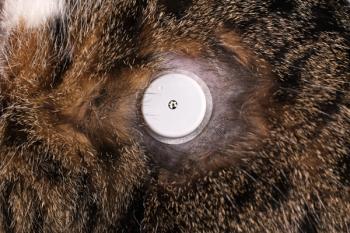
Be aware of clomipramine effects on thyroid function, study says
Several drugs have been reported to alter thyroid function tests in dogs. These include glucocorticoids, potentiated sulfonamides and anticonvulsants, such as phenobarbital. Many other drugs have been reported to affect thyroid function in humans and other species.
Several drugs have been reported to alter thyroid function tests in dogs. These include glucocorticoids, potentiated sulfonamides and anticonvulsants, such as phenobarbital. Many other drugs have been reported to affect thyroid function in humans and other species. Drugs, such as tricyclic antidepressants (TCAs), have been shown to impair thyroid hormone synthesis and thyrotropin secretion in humans and rats. Clomipramine is a TCA that has been used to treat various psychiatric conditions in humans, and was recently approved for the treatment of separation anxiety in dogs.
Clomipramine exerts a potent serotonin reuptake-inhibiting effect by blocking the monoamine reuptake transporter of serotonergic neurons.
In addition, desmethylclomipramine, its primary metabolite, is an inhibitor of norepinephrine reuptake.
TCAs inhibit hormone biosynthesis by altering thyroid follicular cell iodine uptake, as well as inhibiting thyroid peroxidase.
TCAs also interfere with the hypothalamic-pituitary-thyroid (HPT) axis via the serotonergic and noradrenergic systems, and therefore could lead to a decrease in thyroid stimulating hormone (TSH), thyroxine (T4), and 3,5,3'-tri-iodothyronine (T3) concentrations.
- Purpose of the study: To evaluate the effect of long-term clomipramine administration on the HPT axis in healthy dogs. The authors' concerns were that if dogs respond in a manner similar to other species, then evaluation of thyroid function tests may result in a misdiagnosis of hypothyroidism if a dog is tested while receiving clomipramine.
In addition, there was a concern that if clomipramine decreases plasma thyroid hormone, then iatrogenic hypothyroidism may result. Hypothyroidism is a contributing factor to a variety of psychological illnesses in humans, and the therapeutic benefit of TCAs on effective disorders has been positively modulated by thyroid supplementation in both humans and rats.
Aggression has been reported as a clinical sign of hypothyroidism in dogs, although the relationship between hypothyroidism and behavioral disorders is rather tenuous.
If the administration of clomipramine induces hypothyroidism, it may exacerbate behavioral signs, or reduce the potential positive behavioral response to the drug.
- Design of the study: Fourteen random-source healthy dogs were enrolled in a prospective study. Euthyroid status was determined by evaluating serum T4 response to TSH administration. Clomi-pramine was administered to all dogs at 3 mg/kg by mouth every 12 hours beginning on day 0 and continued for 112 days. Serum T4, free thyroxine (f T4) by equilibrium dialysis, T3 and 3,3',5'-triiodothyronine (reverse T3) and TSH concentrations were measured on days 0, 7, 28, 42, 56 and 112. Thyrotropin-releasing hormone (TRH) response tests were performed concurrently. A placebo-treated control group was not included in the study.
- Results of the study: No adverse effects of the medication or clinical manifestations of hypothyroidism were observed during the treatment period. Significant decreases were documented in serum T4, fT4, and rT3 concentrations beginning on day 28 and continued through to the end of the study period. The lowest mean concentrations of T4 and rT3 occurred at day 112, while the lowest mean fT4 was found on day 56 of clomipramine treatment. The effect of treatment over time on serum T3 concentration was also significant, although the deviation in T3 from baseline was variable. No significant effect of clomi-pramine treatment was noted on either pre- or post- TRH TSH concentrations.
- Discussion: The results of the study demonstrated that long-term clomipramine administration decreases T4, fT4 and rT3. These findings were consistent with the suppressive effects of TCAs on thyroid function found in other species. The lack of a placebo-treated control group in the study may have detracted from the results since variables other than the effect of clomipramine treatment could have influenced hormone concentrations over time. However, multiple studies over periods of eight weeks or longer that used similar husbandry conditions have documented little variation in the mean serum T4 and T3 concentrations, although fT4 can be more variable.
The authors extended study period was chosen based on the effect of TCA on the monoaminergic systems (serotonin, norepinephrine and dopamine) via reuptake inhibition of neurotransmitters at the synaptic cleft. These may work by modifying receptor site sensitivity rather than by direct action at the receptor site, thereby taking weeks to affect serotonin concentrations. In addition, negative feedback of the monoaminergic system with resultant upregulation at the level of the synapse is a prolonged process, thereby taking weeks to reach a steady state, even though high plasma concentrations are achieved.
The clinical importance of the decrease in T4 and fT4 with prolonged administration of clomipramine lies in the interference with a diagnosis of hypothyroidism, the potential for the induction of hypothyroidism, and the possible effects on the therapeutic response to clomipramine. The reduction of serum T4 and fT4 concentrations from baseline values by 35 percent and 38 percent, respectively, could lead to a misdiagnosis of spontaneous hypothyroidism. Therefore, thyroid function should be evaluated cautiously in dogs while receiving clomipramine.
Dogs with subclinical thyroid dysfunction, those receiving other drugs that suppress thyroid function, and those with nonthyroidal illness could be at risk for developing hypothyroidism during the administration of clomipramine. Clinical evidence of hypothyroidism was not detected in the dogs of this study, but subclinical hypothyroidism may have existed.
In addition, treatment for a longer period of time could result in more pronounced effects of thyroid function. Ideally, the results of this study should be confirmed in a larger, placebo-controlled population or clinical trial.
Administration of a TCA, such as clomipramine, which has the potential to cause hypothyroidism, may exacerbate behavioral signs or reduce the benefit of the drug. It has been shown in humans that a decrease in thyroid function can be associated with depression, and that supplementation of thyroxine or T3 as an adjunct to refractory depression has been shown to be beneficial. Although similar results have not been demonstrated in the dog, the authors did not recommend thyroxine supplementation. However, it would be prudent to monitor thyroid function tests, in addition to performing physical examinations and bloodwork, including CBC, serum biochemical profile, urinalysis, both prior to and during clomipramine administration, in order to ensure that hypothyroidism is neither misdiagnosed, nor that it subsequently occurs.
In conclusion, TCAs are being used with increasing frequency in dogs, and it is important for veterinarians to be aware of any potential side effects clomipramine may cause. Clomipramine should be added to the list of drugs that alter thyroid function, along with anti-convulsants, potentiated sulfonamides and glucocorticoids.
Newsletter
From exam room tips to practice management insights, get trusted veterinary news delivered straight to your inbox—subscribe to dvm360.




